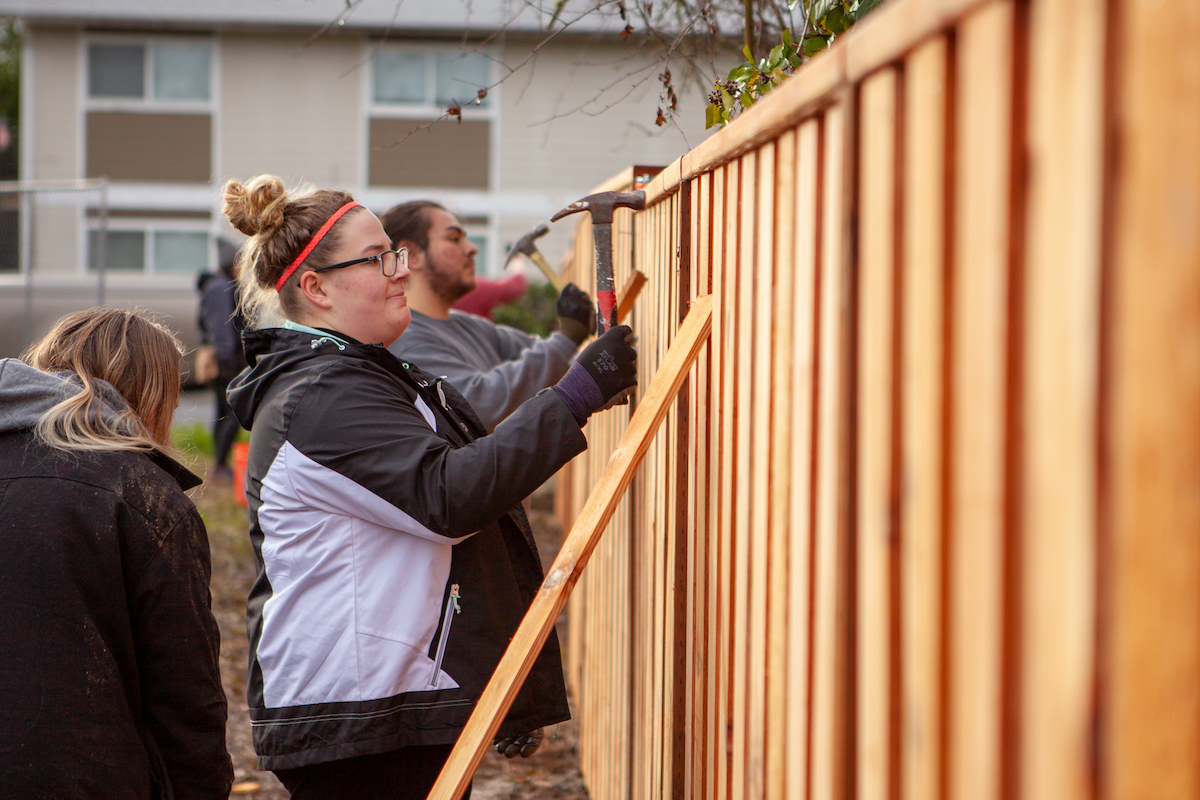Students Learn to Take Action for Affordable Housing
 Nearly two dozen Pacific University students recently found out what it feels like to make a positive difference in someone else's life.
Nearly two dozen Pacific University students recently found out what it feels like to make a positive difference in someone else's life.
During this month’s compressed two-week winter term, 22 undergraduate students satisfied their civic engagement requirement for graduation by completing an enlightening “Action for Affordable Housing” course, through which they learned about the complexities surrounding the issue while literally helping build a home for a local underserved family.
In partnership with West Tuality Habitat for Humanity under the direction of volunteer services coordinator and Pacific alumna Emma Morton ’18, students learned from and worked alongside local Habitat volunteers to plaster drywall, paint, construct a fence and more.
All told, the students put in roughly 26 hours each over four days for a collective total of nearly 600 service hours. As Forest Grove News-Times editor Mark Miller chronicled, the students benefited as much from the experience as single mother Sonja Kataura will when she and her son move in later this year.
Will Bauer '19, a senior majoring in marketing, said the experience provided him a deep sense of satisfaction. “Getting outside and learning something new always feels great to me,” he said. “But meeting who this home is for, and learning her story, has put what we’ve learned about our housing system into an important perspective. We are all human and we all need help at some point in our lives.”
Civic engagement is a hallmark of Pacific University’s mission to inspire students to think, create, care and pursue justice in our world. Thus, the university requires all undergraduate students to complete a designated two-credit course or equivalent service learning project.
Tom McCall Center for Civic Engagement Director Stephanie Stokamer, who has taught the affordable housing course since 2015, said service learning puts what her students learn in class into clearer focus.
“Projects like these, in which our students get to know the person or persons they are directly helping, and can see the results of their time and effort, are incredibly rewarding and energizing,” she said. “It showed them firsthand how working together over even a relatively small amount of time can make a tremendous difference in the trajectory of another person’s life.”
Stokamer said the civic engagement course’s combination of community service and in-class activities, such as panel discussions with local leaders like Rep. Susan McLain, introduced students to the relationships between public policy issues, civic engagement and personal choices.
“A key reason for the graduation requirement is to ensure our students understand that there are many things, large and small, they can do to help effect policy change that can make life better for all of us,” Stokamer said.
Courses like Action for Affordable Housing, she added, educate students about the many variables out of a person’s control that can contribute to a person’s misfortune. Early in the course, students visited the remnants of a local mobile home devastated by fire whose owner could not afford to insure.
“The vast majority of Americans are just one unexpected hardship away from financial catastrophe,” Stokamer said. “It is really important that our students understand their ability to help shape public policy through active citizenship, which includes both expressing themselves to leaders, and by demonstrating their commitment to leaders through tangible action.”


